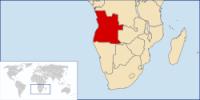
|
| Common name | Angola | | Local name | República de Angola (Portuguese)
Repubilika ya Ngola (Kikongo, Kimbundu, Umbundu)
| | Name | República de Angola (Portuguese)
Repubilika ya Ngola (Kikongo, Kimbundu, Umbundu)
| | Anthem | Angola Avante! (Portuguese)
Forward Angola! | | Capital | Luanda | | Largest city | capital | | Official languages | Portuguese | | Ethnic groups | Ovimbundu, Ambundu, Bakongo, Lunda-Chokwe, Nyaneka-Nkhumbi, Ovambo, Ganguela, Xindonga, Herero, Khoisan | | Demonym | Angolan | | Government | Unitary presidential republic | | President | José Eduardo dos Santos | | Vice President | Fernando da Piedade Dias dos Santos | | Independence | Independence | | from Portugal | November 11, 1975 | | Total Area | 481354 sq mi (1246706.9 km2) (23rd) | | Water % | negligible | | Population Est. | 18,498,000 | | Population census | (scheduled for 2012) | | Density (pop.) | 14.8/km2 (199th) (38.4/sq mi) | | GDP PPP | $109.533 billion (2010) | | GDP (PPP) per capita | $5,748 | | GDP (nominal) | $82.471 billion (2010) | | GDP (nominal) per capita | $4,328 | | Gini | 59 (2000) (high) | | HDI | (+)0.403 (2010) (low) (146th) | | Currency | Kwanza (AOA) | | Time zone | WAT (UTC+1) | | - Summer (DST) | not observed (UTC+1) | | Drives on the | right | | Internet TLD | .ao | | Calling code | +244 |
|
|
Angola, officially the Republic of Angola ( , -ptʁɨˈpublikɐ dɨ ɐ̃ˈɡɔlapron; Kikongo, Kimbundu, Umbundu: Repubilika ya Ngola), is a country in south-central Africa bordered by Namibia on the south, the Democratic Republic of the Congo on the north, and Zambia on the east; its west coast is on the Atlantic Ocean with Luanda as its capital city. The exclave province of Cabinda has borders with the Republic of the Congo and the Democratic Republic of the Congo.
The Portuguese were present in some-mostly coastal-points of the territory of what is now Angola, from the 16th to the 19th century, interacting in diverse ways with the peoples that lived there. In the 19th century they slowly and hesitantly began to establish themselves in the interior. Angola as a Portuguese colony was not established before the end of the 19th century, and "effective occupation", as required by the Berlin Conference (1884) was achieved in the 1920s as with most African colonies. After independence, Angola was the scene of an intense civil war from 1975 to 2002. The country has vast mineral and petroleum reserves; however, its life expectancy and infant mortality rates are both among the worst-ranked in the world.
|
|
|




 RSS
RSS